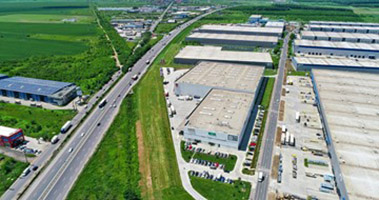
EU4Environment finalises its activities on the pre-feasibility of Eco-Industrial Parks (EIPs) with a dedicated regional event. The middle of March will introduce the results of the pre-feasibility assessments EIPs and present future recommendations for the identified pilot sites in the Eastern Partnership (EaP) region to continue the path towards a green and circular economy.
The purpose of the upcoming event is to disseminate information on the EIP concept, present the international experience on EIP implementation, and share the lessons learned from the implementation of the activity in selected EaP countries.
Based on the EIP Advancement Guideline, the event also proposes
- a tentative plan for possible further actions that could enhance the possibility to implement EIPs in the EaP countries
- introducing the EIP concept and methodology, and presenting relevant international experiences
- depicting case studies from selected EaP countries
- presenting the linkage between RECP and Industrial Symbiosis within EIPs
- discussing the EIP Advancement Guideline for EaP Countries and collecting recommendations and conclusions.
The list of participants will consist of national experts from the EaP countries, representatives of EaP Governments, the European Union, representatives from the business community (including industrial parks and zones), academia, the national implementing partners of the EU4Environment Action, as well as international organisations and institutions. More information will be communicated separately.
Falling under the “Circular Economy and New Growth Opportunities” activities implemented by UNIDO under EU4Emvironment, this project is dedicated to assessing the pre-feasibility of converting existing industrial parks/zones into EIPs. The initial activities were focused on conducting an analysis of existing IPs of two EaP countries, Belarus and the Republic of Moldova to assess possible ways to incorporate best practices for upgrading them into EIPs. The project also developed a set of recommendations to “green” existing parks in two pilot sites in Moldova, and extrapolated lessons learned during the exercises to the regional EaP level.
In the European Union’s EaP countries, EU4Environment is working with selected industrial sites to help them in the transition towards EIPs – two of them are located in the Republic of Moldova. Here, the assignment for undertaking the EIP feasibility assessment took place in the Free Economic Zone Valkaneș and Industrial Park Tracom, which have been designated as pilot territories. The activity was performed by UNIDO with the support of International EIP Experts from DSS+ (former Sofies) and national experts, in agreement with the Ministry of Economy and Infrastructure and the Ministry of Agriculture, Regional Development and Environment in Moldova.
The activities began in July 2021 with a two-day online workshop on the RECP methodology and on industrial symbiosis. Soon after, the two sites received approval to take part in the EIP feasibility assessment. Since then, active collaboration has been fostered among the stakeholders, leading to field missions to FEZ Valkaneș and IP Tracom at the end of June and in November 2022. During the field missions, important meetings with the Ministry of Agriculture, Regional Development and Environment of Moldova, and the two pilot sites were organized.[1]
Across the two sites, there are 95 resident companies which employ around 3200 workers. In the case of IP Tracom (established 11 years ago on a historical tractor manufacturing site), there are 71 tenant companies working in various sectors (construction, technology, vehicle repairs, paper-based products, textile and garments, food production, pharmaceutical activities, thermal energy, and logistics services). A state of art IT hub is also located there, making IP Tracom a highly attractive destination for technology companies.
As for FEZ Valkaneș (a sub-zone with nine active onsite industries), the FEZ offers customs-free business to its tenant companies for any businesses they conduct outside Moldova. This makes it a very attractive site for tenant companies to attract investments and initiate partnerships.
One of the tasks of the project was to draft an EIPs Advancement Guideline for national stakeholders in the EaP countries, using examples from Belarus, the Republic of Moldova, and Ukraine, which will be presented at the regional event. In Ukraine, the work on introducing EIPs is conducted through the Global EIP Programme (GEIPP), funded by the Swiss Government. Thus, the introduction of the EIP concept in the EaP region greatly benefited from opportunities for complementarity between the two technical assistance programmes of UNIDO. The key lessons learned from those are going to be discussed at the forthcoming workshop.
Industrial Parks (IPs) have long been acknowledged as an efficient means to bring together industrial activities, businesses, infrastructure, and services. Whether they are industrial zones, parks, corridors, special or free economic zones, these clusters of co-located industrial activities share a vital common attribute: they are planned and developed to foster economic growth and competitiveness through collaboration and a commitment towards efficiency.[2]
By becoming EIPs, industrial sites enjoy a wide range of benefits (economic, environmental, and social), as EIPs focus on mitigating and managing the adverse impacts of the sites whilst maximizing sustainable development and shared economic opportunities, improving ecosystems and innovation practices, and fostering synergies. Hence, EIP benefits are not only environmental but also commercial and strategic. They help industries become more competitive, reduce exposure to resource and licensing risks, promote business developments, and build a firm reputation for stakeholders and producers. In turn, this leads to EIPs attracting better financial and technology investments, enjoying improved economic gains, and building synergies at the local, regional, and national levels.
[1] Source: https://www.eu4environment.org/news/eu4envrionment-supports-the-feasibility-assessments-for-implementing-eco-industrial-parks-in-moldova/
[2] Source: https://www.eu4environment.org/news/towards-economic-and-environmental-performance-with-eco-industrial-park-pre-feasibility-assessment-in-moldova/





